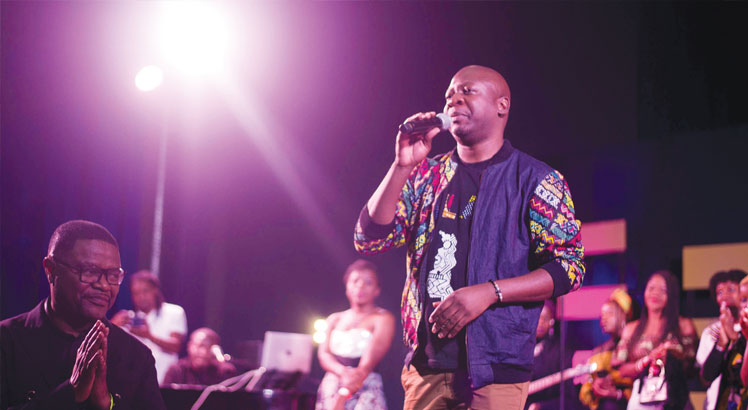Madiba’s long walk to freedom
At exactly 3pm on Saturday, July 22, the upper hall of Jacaranda Cultural Centre (JCC) in Blantyre that was hosting Dikamawoko Arts Taking Madiba was not yet filled to capacity.
People were still entering the hall at a pace you would compare with tap water that comes in dribs and drabs.
Patrons were flocking in single file, pairs and families. When the hall was half-filled, the drama started.
Tawonga Nkhonjera, acting as Grim Reaper (Death) walked onto the stage, singing an inaudible song that had an eerie mood like a dirge. Nkhonjera, the lead actor, was dressed in all black, covering his head with a hood and clutching a machete in his hand.
The eyes from the audience stared blankly in front amazed at the image before them.

Then Constance Thyangathyanga, playing the Creator (Goddess), wobbled onto the stage, following Grim Reaper.
All this while Grim Reaper was singing his monotonous song of death. Then the goddess sat on a pile of tyres, her back facing Grim Reaper who was facing toward the wall, still producing incoherent sounds of death.
She too, broke into singing, “akumwalira, anthu akumwalira”. It was a song flowing from lips that were reluctant.
This style of opening arrested people’s attention. For a play whose theme was death, this created the sombre mood required.
Even as a preamble, Grim Reaper’s first words were words of death—mentioning names of Masauko Chipembere, Grace Chinga, Rose Chibambo and Du Chisiza.
By introducing these names early in the play, he intended to underline the savagery, cruelty and callousness of death in taking away even the most prominent people.
“Life must be lived to the fullest, yet it is full of disappointment for life’s highest point is death—the common denominator, the equaliser—death, that’s where I come in,” spoke Grim Reaper triumphantly.
The words from Grim Reaper were too familiar not to be noted. Death is indeed the climax of life for when death smiles at a man, what a man can do is just to smile back at death.
Grim Reaper, brandishing a blade, said: “Imagine you come face to face with death and your chance at life depended on what you do in life.”
There were giggles from the audience, perhaps imagining that terrible but inevitable encounter with death.
This, again, was the strength of the play—the actor digressing to interact with the audience, thereby allowing the audience to participate in the play.
“Would you say to death, ‘spare me I am a waiter, chef or president?’ Are you an exploiter of people or you are a servant of the people?” Asked Grim Reaper.
The Creator left the tyres, took the ladder, trays of eggs and went to sit at a lonely place where she started performing some rituals.
In exchange, Grim Reaper sat on the tyres, machete in hand, trying to tear some paper, perhaps tired of reaping souls.
Meanwhile, the Creator was looking for Grim Reaper who was visibly intoxicated with beer to go out and perform his duties.
The Creator accused Grim Reaper of being lazy in his job because of beer drinking.
Grim Reaper denied: “I am not intoxicated with beer. You can taste it [beer] if you want.”
“I can punish you,” the Creator threatened.
To this, Grim Reaper answered: “I am already dead,” but the Creator interrupted him: “So you think death is the ultimate punishment?”
Another strength of the play at this point was the different activities taking place on the stage by the two actors. The movement of the props was a good innovation. It gave life to the play and kept the audience attentive.
Now it was time to take away the life of Nelson Mandela. Grim Reaper shuddered. He chronicled the great life of Mandela, starting from Robben Island.
“The life of Madiba, 27 years in prison,” he sighed. “Do you know prison life? Do you know the way they sleep in Malawian prisons?”
“Shamba,” he shouted while mimicking the way prisoners are packed in Malawian prisons.
The dehumanising conditions of prison affect the inmates, like the way Old Cockroach, a character in Alex La Guma’s story, Out of Darkness was affected.
“Can’t we give this man sometime to enjoy his life?” he asked and continued, “this man was the last of the world’s heroes. He was the lost pearl at the bottom of a sea,” he echoed former American president, Barack Obama.
Turning to the Creator, he spoke: “You must have outperformed yourself in creating him.”
But the Creator answered that all humans were created with a promise to be as great as Mandela was.
The hall became quiet except for the sounds of ringing phones and late comers.
“This man was awarded the Nobel Peace Prize. Does that not count for anything for his continual existence?” Grim reaper pleaded.
“I work very hard myself but there is no Nobel Prize for me, even for you Creator,” he said, mockingly.
“Are you trying to convince me of greatness using human merit?” the Creator asked.
“Madiba inspired The Springboks to beat the Wallabies and The All Blacks to win Rugby World Cup. He also inspired Bafana Bafana to lift the African Cup of Nations in 1996,” said Grim Reaper, in defence of Mandela.
Then death, floating like a butterfly, and stinging like a bee, pounced upon the life of Madiba.
“Life of Nelson Mandela, as pleasing as it was, must return to where it came from,” said the Creator as she collected her things, arranged them and sat on the tyres to a deafening applause.





